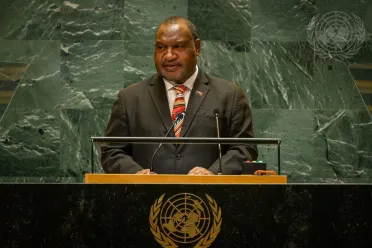Statement
Statement summary
JAMES MARAPE, Prime Minister of Papua New Guinea, emphasized three threats to humanity: religious intolerance, poverty, especially induced by climate change, and geopolitical differences and contests over territories and people. He highlighted that his country is the world’s most culturally and linguistically diverse nation. “We embrace this diversity and do our best to function as ‘one people and one country’, leaving no one behind.” It hosts up to 7 per cent of the world’s biodiversity, and sustainably manages its forest, land and sea “because our livelihood depends on them”. Therefore, it “teaches the world on living in balance with nature, tolerating cultural diversities and practicing environmental stewardship”. His country aims to become a higher-income nation by 2045 and has aligned its development plans with the Sustainable Development Goals.
He underscored that Christianity has helped his nation to manage a diverse, multicultural people and to blend as one nation. Yet, its Constitution protects individuals’ right to choose their religion, and he urged that this remains a key duty of the UN. The UN “must condemn laws that encroach upon individuals’ choice of religion”. Enforcement of one religion upon another is “a threat to peace and coexistence of mankind. I ask the United Nations to keep watch over religious freedom for all people,” he said.
Moving to climate change-induced poverty, he underlined: “The pursuit of wealth has caused man to plunder Earth of its resources beyond the threshold of sustainability, with little consideration for our children’s future.” Ocean nations like his live with climate change-induced sea level rise and weather pattern changes which have become an existential threat. Despite its economic needs, his country remains committed to safeguarding both its blue ocean life and its green forest life “for Earth’s children”. It continues to play a proactive role in progressing its commitments under the UN Framework Convention on Climate Change and the Paris Agreement by undertaking adaptation and mitigation efforts. But he underscored that accessing climate finance remains a challenge and called for the UN to look into this matter with urgency. Otherwise, “we will utilize our rights to liquidate our forest and marine resources to achieve our development aspirations”, expressly alleviating poverty, he said. He said that he speaks in solidarity with all forest nations, especially those in the Congo Basin and Amazon Basin wanting adequate compensation to preserve forests, which are the lungs of Earth. “The responsibility to save our environment and the planet should bear on all of us in equal measure.” UN members must “work together to save these forests, which are global assets”.
Increasing geopolitical conflicts and tensions are fuelling fragmentation and protectionism around the world, he said. The restrictions on trade, disruptions in supply chains and growing competition are crippling local economies. He called for an examination of peaceful strategies and solutions, investment in peacebuilding initiatives, mutual understanding and cooperation to build trust and foster peaceful relationships. The UN’s role in this must be respected by all nations, he added. He provided an example from his own country of successful de-escalation in its internal conflict in Bougainville. There the UN supervised the Bougainville Peace Agreement in 2001 and continues to ensure all its requirements are complied with. His country calls on the UN and its systems to begin the process of Council reform, including the removal of veto power, so that all nations can sit equally at the table.
James Marape, Prime Minister of Papua New Guinea, highlighted that amid the existential threat of climate change, the relentless pursuit of wealth and the unsustainable exploitation of Earth's resources is jeopardizing future generations.
He criticized the attitude of “survival of the fittest”, in which nations and corporations compete to extract resources, resulting in environmental degradation, deforestation, fossil fuel burning and pollution, which further exacerbate poverty.
Despite its own economic challenges, Papua New Guinea remains committed to protecting both its marine and forest ecosystems for the benefit of future generations.
However, he noted that accessing climate finance remains a significant challenge, urging world leaders to address this issue urgently. Without assistance, Papua New Guinea may be forced to exploit its forest and marine resources to meet development goals and alleviate poverty.
“It is for this reason, I speak in solidarity with all forest nations, especially those in the Congo Basin and Amazon Basin for adequate compensation if we are to preserve our forests which, in fact, are the lungs of Earth.”
Full statement
Read the full statement, in PDF format.
Photo

Previous sessions
Access the statements from previous sessions.
